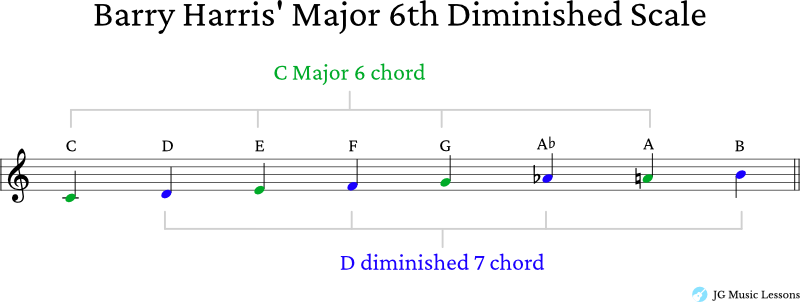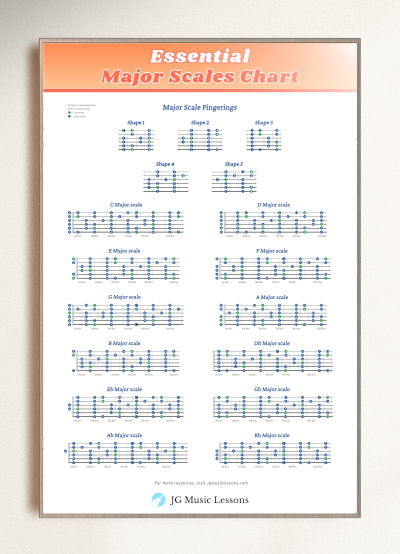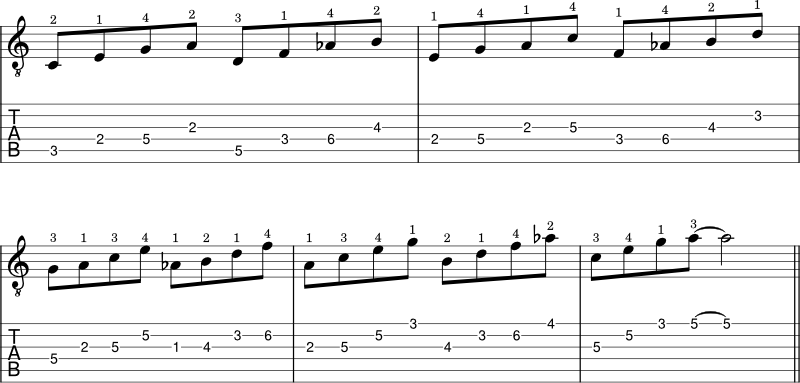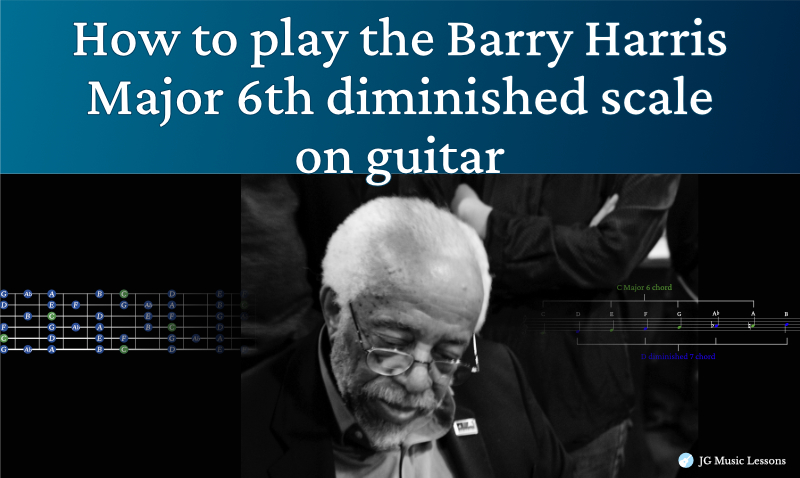Barry Harris was an influential jazz pianist and educator, renowned for his unique approach to harmony and improvisation. In particular, the 6th diminished scale is one of his core concepts, offering a wealth of harmonic possibilities and a distinctive sound to your playing.
In this lesson, we’ll cover specifically how to play the Major 6 diminished scale, scale shapes throughout the fretboard, and application examples with audio.
Grab your guitar and let’s get started!
Understanding the Major 6th diminished scale
The Barry Harris Major 6 diminished scale is a unique scale that combines elements of the Major 6 chord and a diminished chord.
The scale is constructed by adding the flat 6 note to the Major scale. For example, the notes of the C Major 6 diminished scale are C, D, E, F, G, Ab, A and B. *Notice that you have both a flat 6 and a Major 6 scale degree.
The name comes from the fact that you can derive two main chords from this scale:
- Major 6 chord with scale degrees 1, 3, 5, and 6. For example, C Major 6 has the notes C, E, G, and A.
- Diminished 7 chord with the scale degrees 2, 4, b6, and 7. For example, D diminished 7 has the notes D, F, Ab, and B.
Notice how these two chords build the whole scale in the chart below.

These two chords make up all notes of the Major 6 diminished scale:

You would most likely play these chords using drop chords, which would be for another lesson.
What makes this scale so useful?
- The scale creates tension and release with a 1 to 5 chord relationship between the two chords. *Note that the diminished chord acts as a 5 chord which highlights the 3rd, 5th, 7th, and b9 scale degrees.
- The added note between the 5th and 6th degree creates a symmetrical 8 note scale that aligns with strong beats when playing improvised melodies.
Major 6th diminished scale chart in all keys
Before we continue, this chart shows you all of the notes of the Major 6th diminished scale starting on every root note.
| Major 6th dim scale | 1 | 2 | 3 | 4 | 5 | b6 | 6 | 7 |
|---|---|---|---|---|---|---|---|---|
| C Maj 6 dim scale | C | D | E | F | G | Ab | A | B |
| D Maj 6 dim scale | D | E | F# | G | A | Bb | B | C# |
| E Maj 6 dim scale | E | F# | G# | A | B | C | C# | D# |
| F Maj 6 dim scale | F | G | A | Bb | C | Db | D | E |
| G Maj 6 dim scale | G | A | B | C | D | Eb | E | F# |
| A Maj 6 dim scale | A | B | C# | D | E | F | F# | G# |
| B Maj 6 dim scale | B | C# | D# | E | F# | G | G# | A# |
| Db Maj 6 dim scale | Db | Eb | F | Gb | Ab | A | Bb | C |
| Eb Maj 6 dim scale | Eb | F | G | Ab | Bb | B | C | D |
| Gb Maj 6 dim scale | Gb | Ab | Bb | B | Db | D | Eb | F |
| Ab Maj 6 dim scale | Ab | Bb | C | Db | Eb | E | F | G |
| Bb Maj 6 dim scale | Bb | C | D | Eb | F | Gb | G | A |
Now, let’s start learning the 5 scale shapes throughout the guitar fretboard.
Major 6th diminished scale shapes on guitar
This section covers the Major 6th diminished scale shapes throughout the guitar fretboard. Each shape includes music notation with guitar tabs to show you how to apply them in the key of C Major. However, you can still use these same shapes to play any other Major 6th diminished scales.
Afterward, you’ll see all 5 shapes connected on the fretboard in one chart.
How to read the scale charts
For the charts below:
- The left side of the charts shows you the scale notes and the right side shows you the suggested fingering.
- The lowest horizontal line represents the thickest string (Low E) and the top horizontal line represents the thinnest string (high E).
- The green circles represent the root note of the scale and the blue notes are every scale note in between.
- Circles to the left of a chart represent open strings.
If needed, check this link for more on how to read guitar notation symbols.
Shape 1


Scale shape 1 (all fretted notes)
If your guitar is suitable to play past the 12th fret, you can also play shape 1 like this:


Shape 2


Shape 3



Shape 4


Shape 5


Connecting the Major 6th diminished scale shapes on guitar
To show you how the scale shapes connect, here are all the C Major 6th diminished scale notes across the guitar fretboard below.

Major 6 diminished scale application examples
The first 3 application examples are practical melodic lines using the Major 6 diminished scale over a C Major chord. Examples 4 to 6 are more technical examples which are great for mastering the scale.
Example 1

Example 2

Example 3

Example 4 using thirds
The only exception where you get an interval of a Major 2nd is between the scale degrees 5 and 6 on measure 2.

Example 5 using triads
Here, we’re alternating 3 notes for each of the two chords we derive from this scale in different inversions, the C Major 6 chord and the D diminished 7 chord.

Example 6 using 4 note arpeggios
For this example, we’re now alternating 4 note arpeggios from each of the two chords.

Wrapping Up
The Barry Harris Major 6 diminished scale is a valuable tool for any jazz guitarist looking to expand their improvisational skills. We looked at how this unique scale works, different ways to play it around the fretboard, and application examples. Take some time to explore this fascinating scale and try using it over Major chords or some of your favorite jazz standards.
Stay tuned for more lessons for more lessons like this to take your improvisation skills to the next level!
You have to enjoy playing. The old-timers did, and that’s one reason why their music is a lasting music. I feel that I play jazz to entertain the listener, and you just can’t do that unless you yourself are entertained at the same time. – Barry Harris
📘 Get the free guitar practice guide here!
Start Playing Better, Faster
with Pro Membership! ✨
Get the guidance, tools, and support that keep your progress on track:
🏁 Always know what to practice next. Access the full Guitar Learning Roadmap with lessons in sequence.
🎼 Play songs with confidence. Step-by-step lessons of popular, classical pieces and other styles.
📙 Save time and frustration. Clear PDFs and ebooks that save time so you can focus on playing.
🎟️ Get rewarded for consistency. 2 free downloads every month (a $240+ yearly value).
🎁 Keep costs low while you grow. 50% off all charts, tracks, and posters — up to 75% off bundles.
🚫 Stay focused. Ad-free environment keeps you in the zone.
💬 Get help when you need it. Direct member support to keep you on track.

